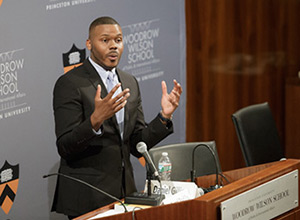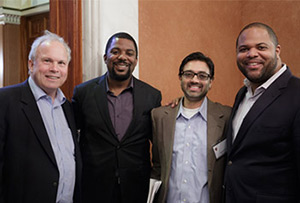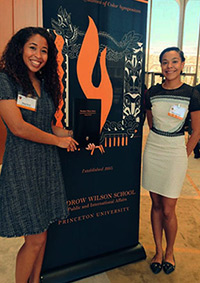Students & Alumni of Color (SAOC), a Princeton School of Public and International Affairs student-led organization, held its 21st annual symposium on April 8-9, 2017. SAOC's mission is to bring together students, alumni and faculty to promote diversity, establish mentoring relationships, discuss issues relevant to the social, political and professional development of students of color, and support the social and political development of communities of color.
Election Day, November 8, 2016, was a day to remember. Students we encountered both at SAOC meetings as well in our personal circles were full of questions about what would come next after the 2016 U.S. presidential election. How do we move forward? And more importantly, how can we use our country’s past to inform our present resistance and solidarity as we imagine a more inclusive future?
 With this as the backdrop to the symposium, we appreciated the outlook of SAOC’s keynote speaker Mayor Michael Tubbs of Stockton, California, who stated, “Our inability to do everything shouldn’t stop us from doing anything.”
With this as the backdrop to the symposium, we appreciated the outlook of SAOC’s keynote speaker Mayor Michael Tubbs of Stockton, California, who stated, “Our inability to do everything shouldn’t stop us from doing anything.”
We understood his message to mean that, as policy students of color, there certainly is work ahead of us, but we should not let the magnitude of the work deter our desire and responsibility to get involved.
Our goal for the symposium weekend was to provide a space where SAOC alumni as well as current and admitted students could discuss the challenges and opportunities in our current political climate. We wanted to have an open dialogue on the power of resistance movements, the state of race relations in our country and what possibilities there are in the future to cultivate a more inclusive society.
Leading off the conference, Mayor Tubbs discussed why he chose to join politics, how he handles the many challenges facing his city and the importance of getting to know one’s constituents. Sitting through his speech, we were moved by his message on the importance of being involved in politics and focusing on values to guide one’s work.
 The panelists, all from disparate fields, emphasized using individuals’ skills towards advocacy and resistance. Panelist Samuel Sinyangwe, co-founder of the research collaborative Mapping Police Violence, discussed the responsibility we have to leverage technology to increase tolerance and acceptance of others. In the dominance of social media, there is certainly a platform to raise difficult questions and organize; however, he reflected: “What does it mean to involve 100 million people in the work of social justice?”
The panelists, all from disparate fields, emphasized using individuals’ skills towards advocacy and resistance. Panelist Samuel Sinyangwe, co-founder of the research collaborative Mapping Police Violence, discussed the responsibility we have to leverage technology to increase tolerance and acceptance of others. In the dominance of social media, there is certainly a platform to raise difficult questions and organize; however, he reflected: “What does it mean to involve 100 million people in the work of social justice?”
Sinyangwe pushed us to think about how technology can provide positive images of communities, build trust and understanding and create a space for advocacy, all while registering with your audience in two seconds or less.
It was amazing to witness the important work and dedication of so many alumni throughout the symposium. Bullard Award winner Nusrat Choudhury MPA ’03, senior staff attorney at the ACLU’s Racial Justice Program, said the time is now to voice our disappointments and act on resisting them. As an accomplished lawyer and former Track B student, she emphasized that her time at the School cultivated her into a stronger public advocate.
Angel Padilla’s role (MPA ’13) in creating the Indivisible Guide to resisting the Trump agenda (a work made in his spare time!), Toni De Mello’s (MPA ’08) work as the director of human rights at Ryerson University, and James Gadsden’s (former U.S. ambassador to Iceland and former lecturer and diplomat-in-residence at the School) thoughtful perspectives on the future of inclusivity in the U.S. were all highlights of the panels. Their words were inspiring and also reminded us that the School cultivates special people — we are a nerdy school that promotes the power and importance of public service.
Ending the conference with Professor Benjamin Jealous and Texas House Representative Eric Johnson brought home the message of the symposium: the importance of giving back to your community and active civic engagement.
 Seeing the symposium come to an end was bittersweet. We had an excellent turnout and thoughtful discussions throughout the weekend. In addition to SAOC graduates signing up to take on mentees, we had a high turnout of alumni throughout the weekend who were excited to share their perspectives, thoughts and work in their career areas. Students were able to connect with alumni and hear from top thinkers and leaders in the political sphere.
Seeing the symposium come to an end was bittersweet. We had an excellent turnout and thoughtful discussions throughout the weekend. In addition to SAOC graduates signing up to take on mentees, we had a high turnout of alumni throughout the weekend who were excited to share their perspectives, thoughts and work in their career areas. Students were able to connect with alumni and hear from top thinkers and leaders in the political sphere.
For the SAOC chairs it was a moment of pride. This annual symposium is a student-led initiative. MPA 1s and 2s came together to deliver a symposium that arrived just in time to encourage us and remind us of our purpose as policy students. We hope we accomplished this!


